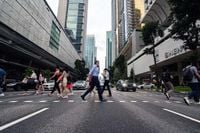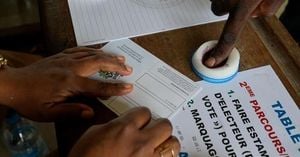For Generation Z, the promise that a college degree would open doors to a thriving career is starting to ring hollow. In 2025, young Americans—especially those under 25 and recent college graduates—are facing an uphill battle in their search for stable employment, despite entering what appears on the surface to be a healthy job market. Beneath the headlines of low overall unemployment and a cooling inflation rate lies a sobering reality: the youngest workers are struggling to find their footing, with many feeling left behind by a system that once guaranteed opportunity for those who followed the rules.
According to recent data highlighted by Fortune and the St. Louis Fed, the unemployment rate for Gen Z Americans under 25 surged to about 4.8% by mid-2025—noticeably higher than the national average of approximately 4.0%. This marks a striking reversal of the traditional pattern, where young college graduates typically enjoyed an easier time landing jobs than the average worker. In fact, it’s the first time in recent memory that new grads face a tougher job market than their older peers.
Federal Reserve Chair Jerome Powell summed up the current predicament, telling Congress, “Kids coming out of college…are having a hard time finding jobs.” He described the present labor market as a “low firing, low hiring environment,” which disproportionately hurts those seeking their first job. With few workers quitting or being laid off, and even fewer new positions being created, entry-level candidates are finding the doors to employment firmly closed.
Why has the job market become so inhospitable for young people? Many point to the rapid changes in technology and the looming threat of artificial intelligence (AI). Yet, as both Powell and leading economists emphasized, AI isn’t the main culprit. Instead, the primary drivers are a broad-based hiring freeze and a cooler economy, compounded by an oversupply of college graduates vying for too few openings. The number of Americans holding a bachelor’s degree has jumped to 37.5% in 2025, up from 25.6% in 2000, with the number of degree holders growing by 75% over the past three decades. This flood of educated talent means new grads are now competing not only with each other but with experienced workers for the same entry-level roles.
The numbers are especially stark for young men. In the second quarter of 2025, 9.1% of U.S. men aged 20–24 were unemployed, compared to 7.2% of women in the same age group, according to The Economic Times. This gender gap, which emerged during the pandemic, has persisted as male-dominated sectors like tech and finance see hiring freezes and layoffs, while female-dominated fields such as healthcare continue to expand.
The broader economic context tells a story of deliberate cooling. After a period of rapid post-pandemic growth, the Federal Reserve raised interest rates from near zero to over 5% between 2023 and 2024 in an effort to curb inflation that had soared to 40-year highs. The result was a sharp slowdown in job creation, with payroll growth falling to just 35,000 per month by mid-2025. By late 2025, the number of job seekers (7.4 million) outstripped job openings (7.2 million), a dramatic reversal from the labor shortages seen just a few years earlier.
The pandemic-era boom in remote work, which once promised greater flexibility and access for young job seekers, is also receding. According to SHRM, remote or hybrid job postings dropped from about 10.3% in early 2022 to approximately 8.3% by late 2023, narrowing the field for Gen Zers who may lack the resources to relocate for work. This contraction in flexible opportunities has left many feeling boxed in, especially as companies increasingly prioritize experienced hires for the limited remote roles that remain.
Beyond the numbers, the emotional toll is mounting. Slate’s Death, Sex & Money podcast recently captured the frustration of early-career job seekers, including Jeopardy champion Brendan Liaw, who described the awkwardness of listing his occupation as “stay-at-home son” on national television. Slate writer Nitish Pahwa explained why even talented, degree-holding individuals like Liaw are finding it so difficult to secure work. Melanie Ehrenkranz, who authors the newsletter Laid Off, discussed the growing prevalence of layoffs and the sense of despair among young people who feel stuck on the sidelines.
Employers, meanwhile, are voicing concerns about a skills gap among entry-level candidates. Surveys show that nearly half of students feel unprepared for the workforce, despite holding degrees. Companies are increasingly dropping bachelor’s degree requirements for some roles, with postings requiring a degree falling to about 17.6% in 2024 from 20% pre-pandemic, according to Indeed Hiring Lab. But this shift means that recent grads must now compete with non-degree holders who may have more hands-on experience, especially in trades and technology fields where practical skills are valued over credentials.
AI and automation are indeed reshaping the landscape for entry-level jobs. Roles in call centers, retail, and even programming are being augmented or replaced by AI, with programmer unemployment rising to 3.0% in 2025 from 2.0% in 2019. Steven Preston, CEO of Goodwill Industries, warned that “AI-driven layoffs are underway in call centers, sales roles, and other entry-level positions. We are preparing for a flux of unemployed young people.” However, as Powell and others have noted, the main story remains one of economic caution and hiring freezes, not technological apocalypse.
Older generations—Millennials, Gen X, and Baby Boomers—are largely insulated from these challenges. Unemployment for these groups remains low, and many are holding onto their jobs longer, leaving fewer openings for newcomers. Millennials who entered the workforce during the Great Recession eventually benefited from a robust job market in the 2010s, but Gen Z is facing a unique hiring freeze at a time of overall economic stability.
The U.S. youth unemployment spike in 2025 stands in sharp contrast to the record-low youth joblessness seen in Europe and Japan. This has led economists like Paul Donovan of UBS to call the U.S. experience “peculiar,” noting that AI and automation have not produced similar outcomes elsewhere.
Looking ahead, economists warn that graduating into a weak labor market can have lasting “scarring effects,” potentially depressing lifetime earnings and wealth accumulation for young workers. The hope is that as the economy stabilizes and older workers eventually retire, opportunities will open up for Gen Z. For now, however, the class of 2025 and their peers continue to navigate a job market that feels stacked against them, searching for ways to adapt and persevere.





